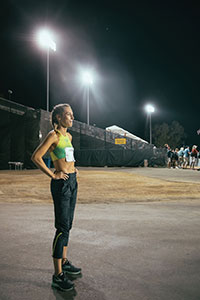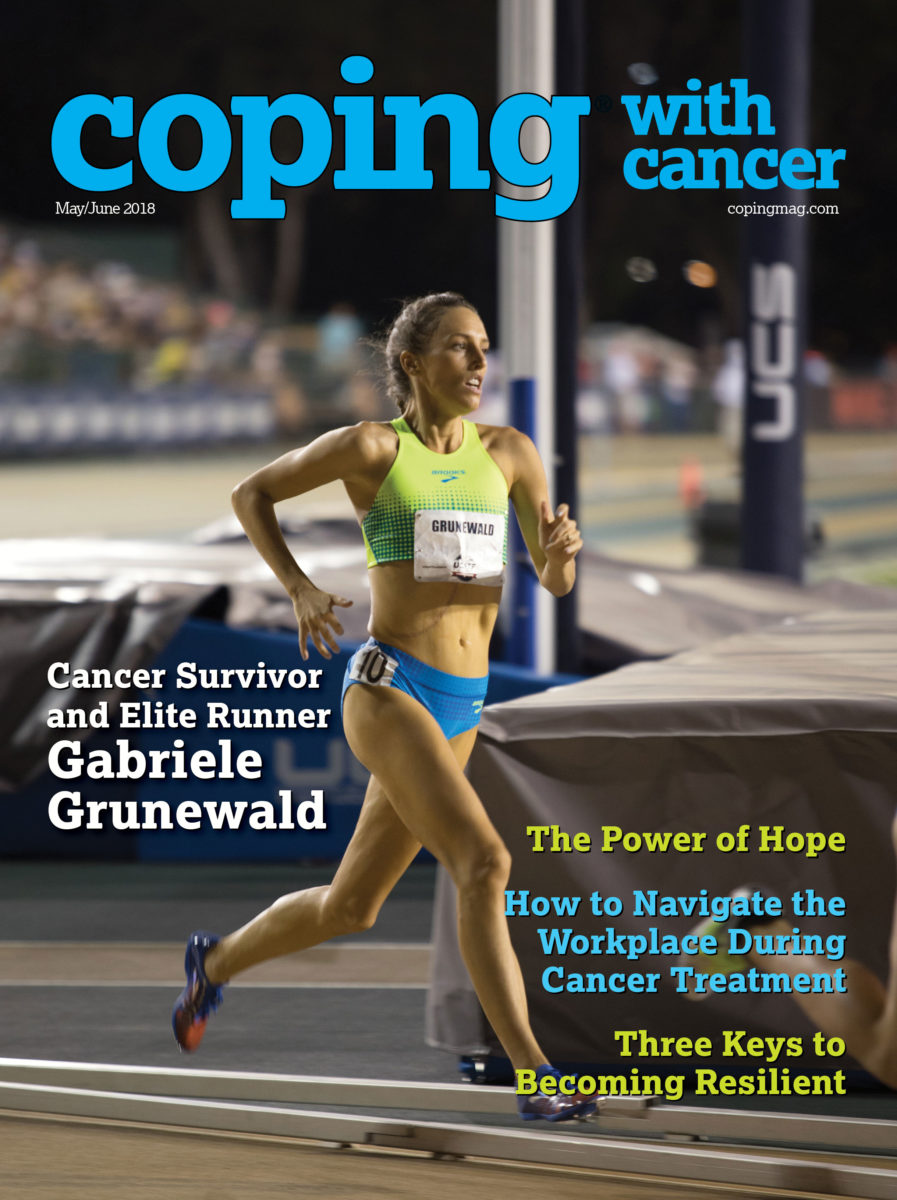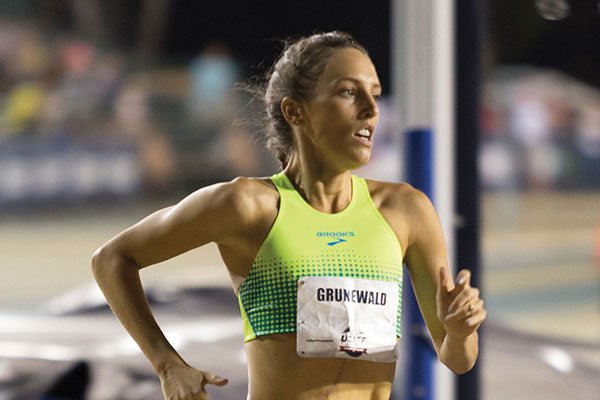Cancer Survivor and Elite Runner Gabriele “Gabe” Grunewald
Can’t Stop, Won’t Stop Running the Race
by Laura Shipp
Gabriele “Gabe” Grunewald is an elite middle-distance runner. She holds a USA Championship title in the indoor 3000 meters. And after coming up just one spot shy of making the London 2012 USA Olympic team, she now has her sights set on Tokyo in 2020.
She also has stage IV cancer – adenoid cystic carcinoma, to be exact. It’s a rare cancer of the salivary glands.
Gabe was first diagnosed with ACC in April 2009, at age 22, while competing in Track & Field for the University of Minnesota. Her cancer was successfully treated with surgery and radiation, and she returned to the track, putting together the best season of her college career.
The following year, during a routine checkup, Gabe’s doctors discovered a second cancer – papillary thyroid cancer. She underwent a thyroidectomy, followed by radioactive iodine treatment. And then she went back to racing. This time, she set a new personal best in the 1500 meters, won her first national title, and passed the five-year cancer-free mark. But, in July 2016, Gabe finds out that her cancer has metastasized to her liver. Following surgery to remove the cancer, along with half her liver, Gabe is thought to be cancer-free. However, this celebratory status lasts only eight months, as a March 2017 CT scan shows several small tumors in her liver. Gabe moves on to her next treatment – immunotherapy, along with liver-directed radiation therapy.
Four rounds with cancer, and through all of it, Gabe Grunewald kept on racing. And she’s inspired thousands (and a hashtag – #BraveLikeGabe) along the way.
Coping recently caught up with this inspirational athlete and cancer survivor to find out what keeps her going. Here’s what Gabe had to say.
Coping: Can you tell us a little about when you were first diagnosed?
Gabe: I was initially diagnosed with adenoid cystic carcinoma when I was 22 years old, in my last year of college. I was in the best shape of my life and planning to have my best season of running. I didn’t have any symptoms in terms of feeling sick; I just felt a small bump under my left ear that didn’t go away.
Coping: What went through your mind when you were told not only that you had cancer, but that it was a rare cancer?
Gabe: I was shocked to find out that I had cancer. I took some solace in the fact that I felt completely normal and that it was not immediately life threatening. But after learning more about my cancer in a Google search, I was definitely scared. I don’t think I really knew how to process the gravity of having a rare cancer. There had not been much research funding or clinical trials specific to my disease at the time, and it was very unsettling to know that there weren’t any FDA-approved treatments for my cancer.

Coping: What is the status of your cancer now?
Gabe: I am currently in treatment (immunotherapy) for metastatic ACC tumors in my liver. My latest scan in January showed a promising amount of tumor shrinkage since I underwent a liver-directed radiation treatment in December, which was really great to hear. I am hopeful for continued good news with my health but know I will likely need some medical advances for new treatment options to achieve long-term survivorship.
Coping: How is this latest bout with metastatic cancer different from the first time around?
Gabe: There is an increased seriousness with my cancer since it spread to my liver in 2016. I was hoping to somehow never get to this stage of cancer, or at least not have to face metastatic disease until I was much older and there were more treatments available. I think I’m getting better at living in between the three-month scans, but it has been a difficult year and a half, for sure.
Coping: Throughout this whole journey, what has been the toughest obstacle to overcome?
Gabe: I think there have been different challenges with each phase of survivorship. Getting a cancer diagnosis as a 22-year-old was really challenging and so unexpected – it changed the way I thought about my life, my relationships, and my future, and not always in a positive way. I’ve gotten better at managing my fears for my future, but it’s something I work through day-to-day.
I’ve found that being a 31-year-old with stage IV cancer has been exceptionally hard because I’m in my prime – as an athlete and also in my reproductive years as a woman – and cancer has gotten in the way of both of those things I planned on doing in my 30s. Being a cancer patient has taken a significant amount of time away from me being able to pursue my potential as a runner, which has been frustrating. And I’m still working through the fact that pregnancy might not be possible for me; I always thought my husband and I would be able to at least try to have children. (I know fertility is uncertain for everyone.) I’m still holding onto hope for that.
Having goals and training for races is fun for me and makes me feel alive. I don’t think I’ll ever stop unless I physically have to.
Coping: What kinds of treatment side effects – physical or emotional – have you experienced?
Gabe: In the last one and a half years, I’ve had a major surgery, a few rounds of chemotherapy, many months of immunotherapy, and a liver-directed radiation treatment. Throughout all of that, I think the toughest, physically, was recovering from surgery. I couldn’t run for about three months, which was hard for me because running is one of the ways that I prefer to cope with cancer. I always feel better, mentally and physically, when I can run.

The toughest side effect of treatment, for me, is the mental side, and also the time component. Falling asleep at night used to be very easy for me, but since my disease has spread, I’ve had more trouble sleeping. Most of my fears about cancer come to the surface when I’m trying to fall asleep, so that can be hard. Also, traveling to and from treatments can take up a large part of a person’s day. Sometimes, fighting cancer feels like a fulltime job – and I’d like to be doing other things!
Coping: Did you ever think about giving up running – at least competitively?
Gabe: I’ve had to give up competitive running every now and then due to a treatment, but I never look at it as a permanent situation. Having goals and training for races is fun for me and makes me feel alive. I don’t think I’ll ever stop unless I physically have to. My goal is to compete again at the U.S. Olympic Trials in 2020, and I don’t think it’s time to give up on that goal.
Coping: Has having cancer changed your goals or perspective on life?
Gabe: Yeah, definitely. I don’t think anyone who’s had cancer hasn’t had their life perspective permanently altered. I see my life unfolding in shorter segments – I don’t really allow myself to look 10 to 20 years down the road; I’m thinking more about today, tomorrow, and next year. Cancer has helped me live in the moment. I see life more as quality versus quantity at this point. I think you can have a short, well-lived life. I don’t think living to 100 necessarily has to be the goal – that would be great, of course, but to me it’s more about living and loving as much as I can with however many years of life I happen to get.
Coping: What about your relationship with running? Has that changed at all?
Gabe: My relationship with running has definitely changed. I used to run for fun and to see how fast I could go. But I now run to clear my mind and to just take a break from the stresses of doctor’s visits, treatment decisions, and everything else that clouds my mind as a cancer patient.
Coping: What made you decide to be open about your cancer on social media?
Gabe: It isn’t always easy, but my life as an elite athlete puts me in the public eye, and cancer just happens to be a very real part of my journey. Sharing my story has always felt like the right thing to do. I want rare cancer patients to have a great chance of a long, well-lived life in the future. That’s not how I felt when I was diagnosed, and I want to do everything I can to change that.
Coping: What’s in the future for you now? Do you have any goals you are working toward?
Gabe: Yes, I always have goals, and this year is no different in that sense. Setting goals has helped me move through my disease over the last nine years, and I hope I never stop setting new goals. This year, I’m hoping to return to competitive running over the summer and fall. I’m not exactly sure what that will look like for me, but I’m not ruling anything out. My focus over the winter has been launching my nonprofit, the Brave Like Gabe Foundation. Rare cancers really need a voice, and I’m happy to provide mine.
Coping: What would you tell someone who has just been diagnosed with cancer, or someone who is facing a recurrence?
Gabe: I think the most important thing for someone encountering a new diagnosis is to not be afraid to take time for yourself as needed and really listen to your instincts about how to proceed. I think cancer survivorship is such a unique journey. And even though so many people will offer well-meaning advice, only you really know what’s best for you and how you want to spend your precious time.
As far as recurrences go, they are tough. There’s no way around the fact that they are tough. As cancer survivors, we are always trying to get back to our “regular lives,” so it’s very difficult when life gets interrupted and we have to deal with cancer again. For me, it’s helpful to remember I’ve been through it before and I know firsthand how I got through it the first time.
But I really think, no matter what phase you are in on your cancer journey, you have to hold onto hope. Hope that health is in your future, maybe, or even just hope that there is meaningful life in the time you have left.

“Brave Like Gabe” started as a hashtag to support Gabriele “Gabe” Grunewald as she sought treatment for her third battle with cancer in 2017. The Brave Like Gabe Foundation was formed in 2018 as a way for Gabe to continue to share her story and make a difference in the cancer community. To learn more, visit BraveLikeGabe.org.
This article was published in Coping® with Cancer magazine, May/June 2018.
Editor’s Note: Gabriele “Gabe” Grunewald passed away on June 11, 2019.


